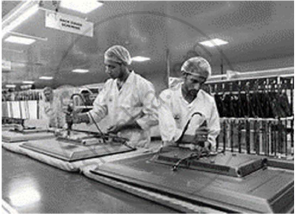Advertisements
Advertisements
Question
Find the sum of the integers between 100 and 200 that are
- divisible by 9
- not divisible by 9
[Hint (ii) : These numbers will be : Total numbers – Total numbers divisible by 9]
Solution
i. The numbers (integers) between 100 and 200 which is divisible by 9 are 108, 117, 126,..., 198.
Let n be the number of terms between 100 and 200 which is divisible by 9.
Here, a = 108, d = 117 – 108 = 9 and an = l = 198
`\implies` 198 = 108 + (n – 1)9 ...[∵ an = l = a + (n – 1)d]
`\implies` 90 = (n – 1)9
`\implies` n – 1 = 10
`\implies` n = 11
∴ Sum of terms between 100 and 200 which is divisible by 9 is
Sn = `n/2[2a + (n - 1)d]`
`\implies` S11 = `11/2[2(108) + (11 - 1)9]`
= `11/2[216 + 90]`
= `11/2 xx 306`
= 11 × 153
= 1683
Hence, required sum of the integers between 100 and 200 that are divisible by 9 is 1683.
ii. The sum of the integers between 100 and 200 which is not divisible by 9 = (sum of total numbers between 100 and 200) – (sum of total numbers between 100 and 200 which is divisible by 9) ...(i)
Total numbers between 100 and 200 is 101, 102, 103,..., 199
Here, a = 101, d = 102 – 101 = 1 and an = l = 199
`\implies` 199 = 101 + (n – 1)1 ...[∵ an = l = a + (n – 1)d]
`\implies` (n – 1) = 98
`\implies` n = 99
Sum of terms between 100 and 200,
Sn = `n/2[2a + (n - 1)d]`
`\implies` S99 = `99/2[2(101) + (99 - 1)1]`
= `99/2[202 + 98]`
= `99/2 xx 300`
= 99 × 150
= 14850
From equation (i), sum of the integers between 100 and 200 which is not divisible by 9
= 14850 – 1683 ...[From part (i)]
= 13167
Hence, the required sum is 13167.
RELATED QUESTIONS
If the sum of the first n terms of an A.P. is `1/2`(3n2 +7n), then find its nth term. Hence write its 20th term.
Find the sum of first 22 terms of an AP in which d = 7 and 22nd term is 149.
If the pth term of an A. P. is `1/q` and qth term is `1/p`, prove that the sum of first pq terms of the A. P. is `((pq+1)/2)`.
The sum of 5th and 9th terms of an A.P. is 30. If its 25th term is three times its 8th term, find the A.P.
The number of terms of the A.P. 3, 7, 11, 15, ... to be taken so that the sum is 406 is
If \[\frac{1}{x + 2}, \frac{1}{x + 3}, \frac{1}{x + 5}\] are in A.P. Then, x =
The sum of first 15 terms of an A.P. is 750 and its first term is 15. Find its 20th term.
Find the common difference of an A.P. whose first term is 5 and the sum of first four terms is half the sum of next four terms.
Read the following passage:
|
India is competitive manufacturing location due to the low cost of manpower and strong technical and engineering capabilities contributing to higher quality production runs. The production of TV sets in a factory increases uniformly by a fixed number every year. It produced 16000 sets in 6th year and 22600 in 9th year. |
- In which year, the production is 29,200 sets?
- Find the production in the 8th year.
OR
Find the production in first 3 years. - Find the difference of the production in 7th year and 4th year.

